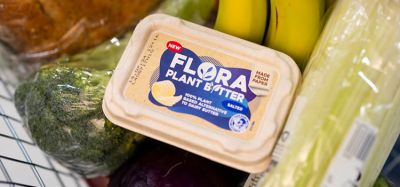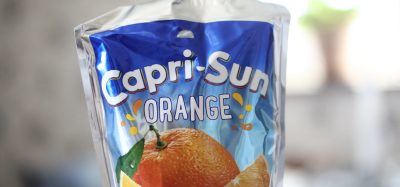Pioneering the jackfruit food craze
- Like
- Digg
- Del
- Tumblr
- VKontakte
- Buffer
- Love This
- Odnoklassniki
- Meneame
- Blogger
- Amazon
- Yahoo Mail
- Gmail
- AOL
- Newsvine
- HackerNews
- Evernote
- MySpace
- Mail.ru
- Viadeo
- Line
- Comments
- Yummly
- SMS
- Viber
- Telegram
- Subscribe
- Skype
- Facebook Messenger
- Kakao
- LiveJournal
- Yammer
- Edgar
- Fintel
- Mix
- Instapaper
- Copy Link
Posted: 14 June 2019 | Dan Staackmann (Upton’s Naturals) | No comments yet
Dan Staackmann is the Founder and President of Upton’s Naturals – an independently-owned natural foods company with a focus on meat alternatives and vegan values. Here he explains their passion and the process for bringing pre-seasoned, ready-to-eat jackfruit to the marketplace.
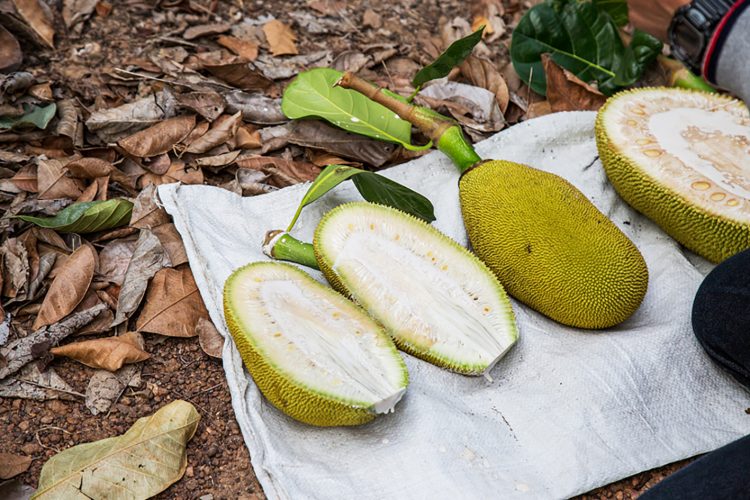

As vegans for more than 20 years, we’re always in search of simple and convenient foods that fit our lifestyle. Over time, we’ve learned that if we want something we can’t find in the marketplace, we should make it ourselves and that philosophy led us to get started in the seitan, and subsequently jackfruit, business. We knew it was a versatile meat alternative made with recognisable ingredients, but wished it was conveniently paired with familiar, delicious seasonings. That wish was the starting point that eventually saw us build a production plant from the ground up and start producing the first, flavoured seitan in our hometown of Chicago.
Nepalese jackfruit sparked inspiration
The inspiration for our jackfruit followed a similar path. Before trying it ourselves in 2010, my partner Nicole Sopko, who is also Upton’s Naturals’1 VP, began hearing about a handful of restaurants serving jackfruit tacos and barbecue sandwiches. We fell in love with it when we tasted a jackfruit dish at a
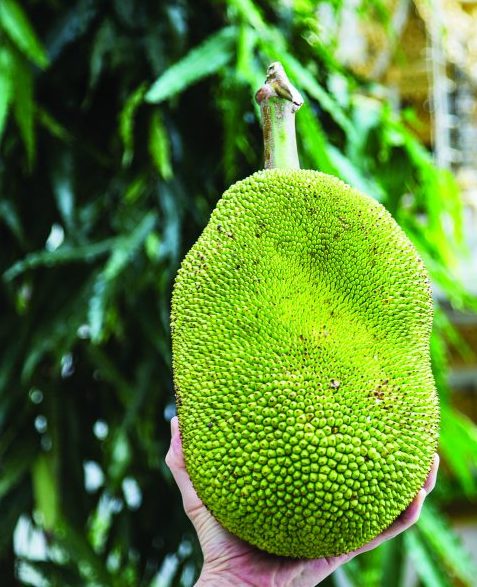

Jackfruit is a versatile tropical fruit with a sweet flavour
Nepalese restaurant and wished the process to cook it at home was easier. Fresh, unripe jackfruit is incredibly hard to come by, not to mention very sticky and messy to work with. The closest thing to convenience in the category was canned jackfruit packed in water or brine, and this option is filled with preservatives and only sold at Asian specialty stores. Transporting water from Asia only to dump it down the drain in the United States didn’t make sense to us, and those cans also required additional processing and longer cooking time for the consumer. Some recipes recommended cooking the jackfruit for up to three hours for an amount of product that only yields two to three sandwiches. That’s a lot of work for a little sandwich. We wanted to give consumers a responsible, clean-label, fast and delicious solution; so we made it our personal mission to bring pre-seasoned, ready-to-eat jackfruit to the marketplace.
Finding the right partner
To determine our fi rst steps, we started by contacting every company that sold the cans, but none of them took us seriously. Many told me, “Americans don’t want that much jackfruit,” or clearly let me know that it wasn’t worth their time to have a conversation. I confi dently approached a couple of the bigger brands at trade shows, but they couldn’t be bothered with me. It took a few years of rejections to realise that I needed to get on a plane and visit factories all over Asia until I found the right partner. Jackfruit turns quickly, so shipping the raw fruit to the US to be processed wasn’t an option. It also didn’t make sense to ship the whole fruit only to send much of it to a landfi ll – or in the best case, a compost heap. It took extensive learning on our part to come up with the best processes for the task, and we had to become educated on every aspect of this project; from cultivation and processing, to packaging, importing and exporting.
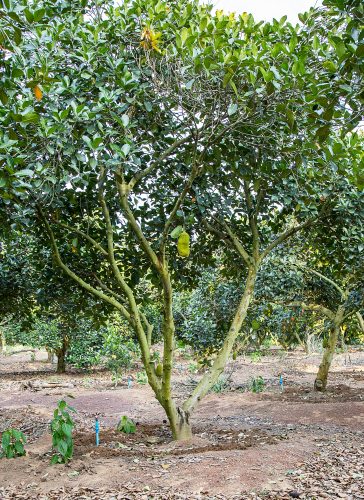

Most Jackfruit trees average 15 feet tall, but some can be over 50 feet tall
First, we got to know the farms, which range in size from 20 trees to more than 2,000 trees. Most of the trees average about 15 feet tall, but we’ve also seen trees over 50 feet tall! Jackfruit is harvested by hand because the fruit grows on both the trunk and all branches of the tree. With the right climate conditions, the trees don’t need much to thrive and are known for quickly producing fruit without much input. They bear fruit within just a few years and have a high tolerance to pests. We then learned that ensuring success wasn’t just about fi nding the right farm; but fi nding one that was also close to a world-class processing facility. The equipment and skillsets required for farming and processing are totally diff erent, and the equipment required is a multi-million-dollar investment that needed to be in place along with proper accreditations and infrastructure.
After an exhaustive search, we ultimately found a partner in Thailand to do all the processing and packaging before shipping the fi nished product overseas. Jackfruit is widely cultivated in Thailand, but there were a couple of other countries in the running, including Sri Lanka. Despite being one of the top three producers of jackfruit, India was not an option for us after we heard from some major processors that, “We might need to bribe forest rangers to get the volume you’re looking for.” We did not feel comfortable with this type of approach. Instead, we wanted a partner with good references, accreditations, and one we had a good feeling about on a personal level. The network of family farms tied to the processing facility we found had been growing cultivated jackfruit for many years and was on board with my request to sell me the unripe jackfruit in addition to the ripe fruit they were used to selling. This created extra demand for the farmers, who prior to the arrangement often had unused crops, and resulted in a mutually benefi cial relationship.
Refining the process
In addition to fi nding the right partner, another challenge we faced when working to bring Upton’s Naturals’ Jackfruit to market was matching recipes that we had developed in the US. Spices don’t always taste the same in all parts of the world, and it took quite a bit of trial, error, and time to refi ne the process from harvest to shelf. We worked through this issue and other challenges though, and our determination led us to be the fi rst company to make pre-seasoned, heat-and-serve, natural jackfruit nationally available to the US market. Our product line-up included Bar-B-Que, Chili Lime Carnitas and Thai Curry flavours to start. Made with only simple, recognisable ingredients, each fl avour off ers a good source of fibre, is completely free of cholesterol, gluten, soy, oil, GMOs, and artifi cial fl avours, and is 100 percent vegan. We went on to introduce new Sweet & Smoky and Sriracha Jackfruit varieties, plus an Original version for cooks wanting to add their own spices.
Launch to market
Jackfruit’s launch to market went well and was so very diff erent to our experience of introducing our seitan retail products in 2006. At that time, the vegan landscape was much more niche. In fact, we used to have ‘vegan/vegetarian’ on the packaging because we were afraid people wouldn’t know what the word vegan meant. By the time we launched Upton’s Naturals’ Jackfruit in March 2015, vegan diets were gaining awareness, as was jackfruit. There had already been a few larger articles published about the fruit as a meat alternative and they multiplied from there.


Upton’s Naturals’ jackfruit range is suitable for a mainstream palate
While we weren’t the first to introduce jackfruit to American consumers, we were the first to make it easy to enjoy, and our timing couldn’t have been better. Mainstream press began quoting us in educational articles about jackfruit, sharing news of our products and touting jackfruit as the top food trend of 2017, 2018 and still into 2019. A few other companies liked our idea of selling pre-seasoned, heat-and-serve jackfruit in a pouch and brought their own version to market. Simultaneously, veganism started to resonate with a mainstream audience and jackfruit became known as the diet’s go-to, whole-food meat alternative for pulled chicken or pork. This exposure helped with education and awareness of our products and ultimately kickstarted the jackfruit food craze. We suspect that the market will continue to grow over the next few years.
Growth
Since our launch of Jackfruit in the US, Upton’s Naturals doubled its staff and grew by 300 percent. Our team outgrew the live/work space we built in 2013 and expanded into a new production space that is six times the size, all the while staying independently owned and operated. We also leveraged our partner relationships in Thailand to bring shelf-stable, pre-cooked vegan meal kits and the first vegan, shelf-stable, pre-cooked mac & cheese to market. Our products are currently sold in over 5,000 stores2 in the US, including leading retail chains like Whole Foods Markets, Walmart, Wegmans, Sprouts, Stop & Shop, Giant, King Soopers and Safeway/Albertsons. We have huge appreciation for our retail partners that have shown support for the meat alternative category and promoted it in the same manner as for big food businesses and subsidised commodities with significantly larger trade spend budgets.
Exciting opportunities
In 2017, our company saw 100 percent growth over 2016 and started to launch products in 15 countries worldwide. Today, we’re celebrating our jackfruit products being sold in over 1,000 retail locations across the United Kingdom, including 800 Holland & Barrett and more than 300 Sainsbury’s stores, along with natural and conventional retailers throughout Canada, New Zealand, Australia, Finland, Denmark, Sweden, Norway, Germany, Iceland, Ireland, Chile and Mexico. The response from International markets has been very positive. The awareness of jackfruit and adoption of vegan diets at retail and in restaurants is just beginning on a global level. We’re excited to be at the forefront of the movement and making an impact by bringing quality and convenient meat-free options to consumers. Just as we did with our US rollout, we’re learning along the way and seeing sales grow. For example, people in other countries don’t eat spicy barbecue the same way we do in the US, so we’ve made some changes to the Bar‑B‑Que Jackfruit flavour to appeal to local taste buds. We also discovered the importance of organic certification, which we will have available in Europe this summer.
Following the passion
When we started down the path of bringing pre-seasoned, heat-and-eat jackfruit to market, we didn’t suspect it would be the next big thing. We just knew that we liked it and thought other people would too. I think that mentality is a big part of why we’ve been successful. We haven’t followed trends, we’ve followed our passions.
We took meat alternatives like seitan and jackfruit that have been around for thousands of years, updated them for today’s consumer and a mainstream palate, and made them convenient and easily accessible. While we did this because it was what we wanted for our own diet and lifestyle, the response has been amazing. We truly are proud of the impact our products have had on more people embracing veganism and are excited for the change we can continue to make as Upton’s Naturals moves to its next stage of growth.
About the author
DAN STAACKMANN is the Founder and President of Upton’s Naturals, an independently-owned, ethical vegan food company based in Chicago, IL. A 25-year vegan and long- time advocate for animal rights and environmental sustainability, Dan founded Upton’s Naturals in 2006 with a DIY attitude and slow-growth business model. Beginning in a shared kitchen, Dan created and introduced the first integrally-flavoured packaged seitan. In 2013, Dan worked with award- winning architects, UrbanLab, to design and build a mixed-use building in Chicago’s West Town neighbourhood that includes private living space, offices, production space, and a café called Upton’s Breakroom.
References
- www.uptonsnaturals.com
- http://www.uptonsnaturals.com/ where-to-buy
Issue
Related topics
Related organisations
Giant, King Soopers, Safeway/Albertsons, Sprouts, Stop & Shop, Walmart, Wegmans, Whole Foods Markets



